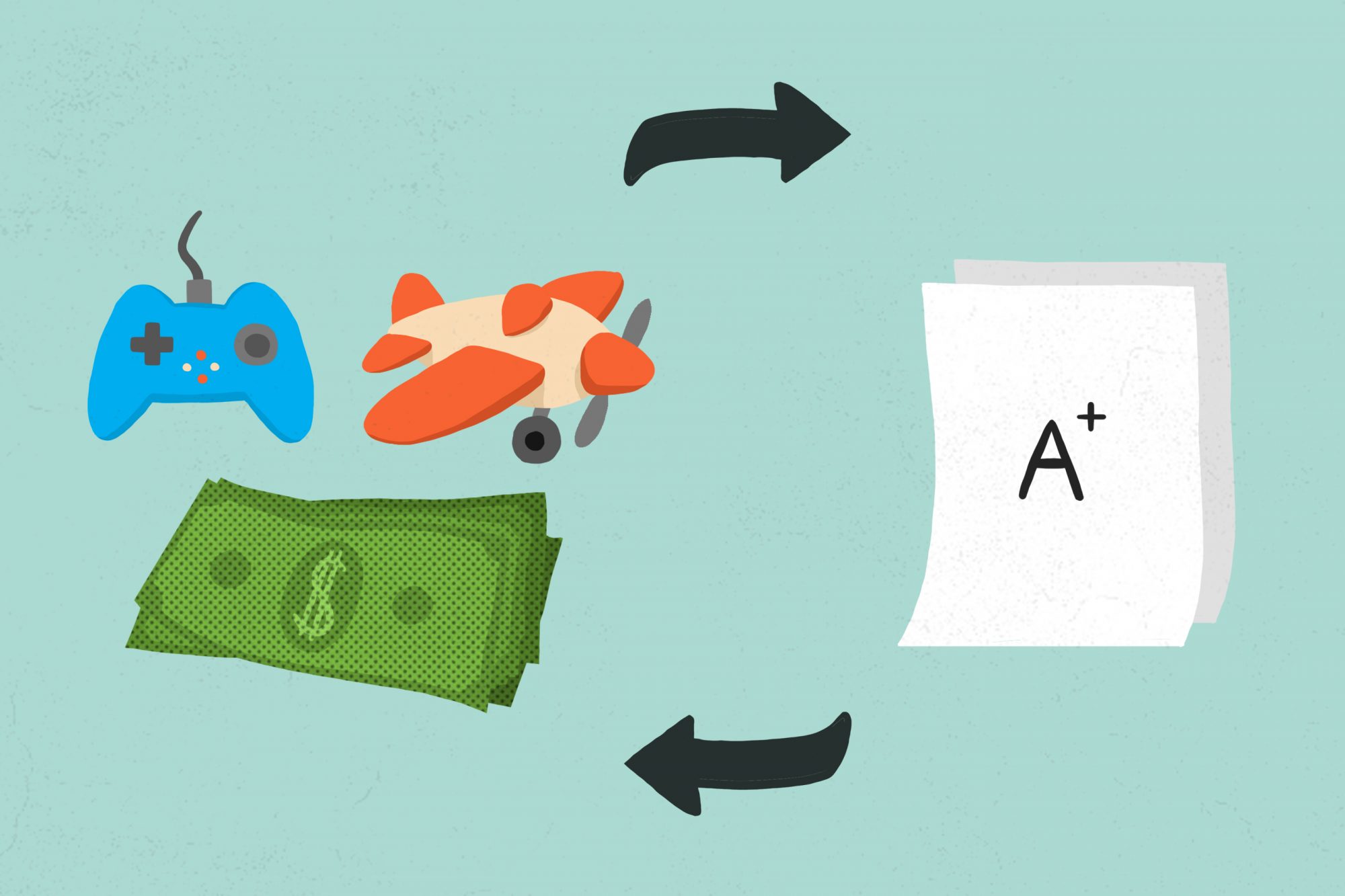
When my kids were little, I would take them to the toy store after they got their report cards to celebrate. Their grades did not matter and they always got an E for effort. Now that they are older and grades are more important, is it OK to reward them with money or toys for their good grades?
Dear Pay for the A,
There has been much debate about using cash as a reward for kids (see the abundance of think pieces about chores!). Most evidence shows that cash rewards might work in the short-term, but the benefits don't last. The main concern is that the external reward does not build internal motivation, which is key to sustaining effort and a lasting good outcome.
Be Mindful About Rewards
More and more research has shown that a focus on effort over outcome relates to greater persistence and confidence across types of tasks, including academic, which often means better learning and performance. It sounds like you want to acknowledge and encourage positive performance in school, so I suggest thinking more specifically about what you want to accomplish. Is it that your children earn certain grades, or do you want to instill values represented by good grades, like a strong work ethic and the importance of education?
The next question to ask yourself: Is there a problem? Using rewards is typically designed to target a problem behavior in order to shape a new behavior. If your children struggle to do well in school, and you offer the money or toys to help motivate them to do better, there are other strategies that may be more effective.
Reinforce Good School Behavior
First, determine what is getting in the way of better grades. Is a child not doing homework, or having trouble understanding the material, or both? After identifying the problem, think about the frequency of reinforcement. Rewards work best in short-term increments. For example, a child earns a shopping trip to the dollar store if they turn in all their homework for a week. Rewards need to be even more frequent for younger children for the reinforcement to actually work (that's where stickers come in, although many kids need more persuasion than stickers). Also, the size of the reward should match the behavior—the shorter the increments, the smaller the reward. No huge Lego sets for having a good week at school!
Personalize Your Approach
Think about what your children actually need for doing well in school. That can look different depending on the child's strengths, and a blanket focus on "good grades" may leave out important ways to celebrate those strengths. Maybe there's a struggle with procrastination, so they earn rewards for working ahead on projects. This keeps the focus on the process of learning rather than the outcome of a final grade.
Is Using Rewards Bribery?
Your question brings up one of the most common parenting questions I hear: Is using rewards bribery?
As a psychologist, I am trained in behaviorism (using rewards and consequences to shape desired behaviors), which is a huge component of treating children who come to therapy for help with problem behaviors. But how does this translate into regular life with kids? The most common concern is that by using rewards, we send the message that they "get something" for doing what they need to just do as part of life. That can be true—if we don't use rewards right.
Bribery is not the same as behaviorism. Bribery involves giving the reward before the desired behavior, and behaviorism is using the reward after the behavior, which is considered reinforcement. One of the keys to using this approach effectively is that you are targeting a problem, not just handing out toys and prizes throughout the day as they brush teeth, get dressed, do homework, etc.
Focus on Experiences Over \”Stuff\”
Based on your question, it seems you are wanting to celebrate at the end of each semester. Instead of cash or toys for grades, I recommend planning a fun family outing and shifting the reward concept from material gain to experiences. My family has a tradition of going out to dinner the first day of school every year. Although this is clearly not a reward for anything, it's a ritual of ushering in the excitement and hope of their next grade level.
Your family may want to celebrate getting through another grade level at the end of the school year, honoring hard work and personal accomplishments, rather than focusing on specific grades. For most kids, that special outing is its own reward and is more memorable and meaningful than a new toy.
Submit your parenting questions here, and they may be answered in future 'Ask Your Mom' columns.
Emily Edlynn, Ph.D., is the author of The Art and Science of Mom parenting blog and a mother of three from Oak Park, Illinois. She is a clinical psychologist in private practice who specializes in working with children and adolescents.
Read more 'Ask Your Mom' columns:

